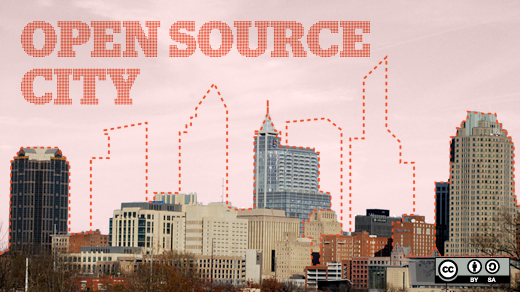I started pondering what qualities would define an open source city a few months ago when my friend Tom Rabon mentioned it to me one day. I was curious how the city I live in, Raleigh, NC, could attract other open source companies and be the world's hub for open source and a leader in open government. How could Raleigh be the open source capital of the world, similar to what Silicon Valley is to technology and Paris is to romance?
I think the answer can be found in both the government and the people.
First, our government has to be willing to embrace the open source way of doing things. They need to be transparent in their handling of business and foster citizen participation. Citizens need to be willing to participate and contribute their time and knowledge. Both need to embrace rapid prototyping to explore new ideas and innovative solutions.
But what sets Raleigh apart from other places? What makes Raleigh ready to be an open source city over New York, San Francisco, London, Paris, Beijing? I sat down with the mayor of Raleigh, Charles Meeker, to explore what makes a city open source.
Mayor Meeker was elected in 2001 and has since grown accustomed to the open source way, primarily by learning about Red Hat and the open source development model. As an attorney, it's no surprise that Mayor Meeker understands the benefits of collaboration and shared knowledge. Let's find out why the City of Raleigh is ready to stake the claim as the world's first open source city.
What one big opportunity, outside of technology, has the best chance of being solved the open source way (i.e., through collaboration, transparency, sharing, meritocracy, rapid prototyping, community, etc.)?
The use of more energy-efficient lighting is one area the City of Raleigh has focused on and where we are seeing returns. We are actively promoting and sharing our experiences with other municipalities, including testing how much electricity is being used and the quality of light being produced. Sharing this information is a big part of our experience.
The City of Raleigh has over 40 LED installations with an average savings of $200k/year on electricity costs. The payback is typically 3-5 years (considering capital costs). It’s a great option for remote parking. You can easily install a few solar panels and not have to add new lines and infrastructure. The possibility for cities around the world to adopt energy efficient lighting is a great opportunity—the City of Raleigh wants to be a part of that story and to be known as an early adopter. Spreading the word on LED lighting with the help of our partner, Cree, is important to us.
What are your thoughts on open government or gov 2.0, and what can the city of Raleigh do to have a more open and transparent government with its citizens?
First, all of our meetings are open to the public, with very few exceptions. The real challenge is to take advantage of the expertise from all of our citizens. There is a lot of great talent out there that can help solve real problems for the city.
One way is through new boards, like the new rail board we established, and how their advice and recommendations are handled by the city. Issues around storm water and utility fees have allowed us to tap into the expertise of our citizens to lead to better solutions.
Rail is an area that will be ongoing for the next 3-4 years. We have many experienced individuals out there that are willing to share their knowledge and apply what they know to help formulate future decisions on rail.
Having the public see what we're doing and provide the right recommendation is an asset that is underutilized, but we have had success, such as when the storm water management board made recommendations on how to better manage flooding. The City Council was able to use the expertise from the board to make better policies around storm water management.
What qualities make a city open source?
Three things come to mind:
- Willingness to share
- Willingness to receive information
- The right attitude to be innovative, creative, and try new things
Citizens need to be willing to adopt to the future. Open source is a strategy we are using to move forward.
Why is Raleigh primed to be the world's first open source city?
Our citizens are ready for Raleigh to move forward and be more open source focused. The technology is successful. Raleigh is ready to be the worldwide hub for open source.
The advantage Raleigh has is around growth and jobs. We'd like to see the convention center host more open source focused conferences. We'd love to see a bunch of smaller Red Hats, start-up companies and established companies, come to the area because we embrace open source.
Partners are also a big part of the answer. The Convention Center, Visitor's Bureau, Chamber of Commerce, and other partners need to embrace open source and highlight it as part of our economic development strategy.
How do you use the open source way in your everyday life?
In the law firm I work at, I try to provide information to younger attorneys. Sort of a sharing of the trade secrets to help them succeed faster. And quite frankly, one of the hardest things for any person in public office is to listen. I've found that listening is 70-80% of the job. You have to fully understand what is going on in order to make an informed decision.






15 Comments